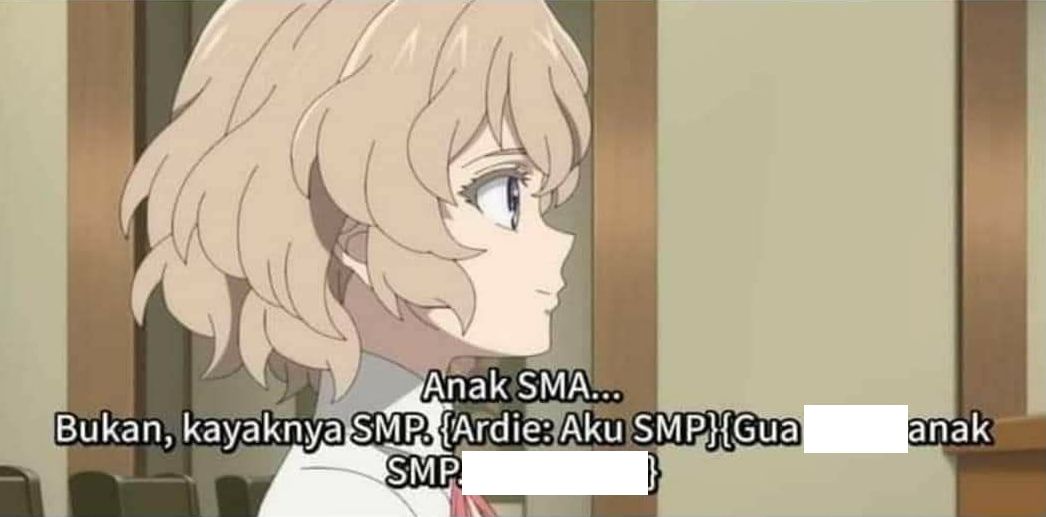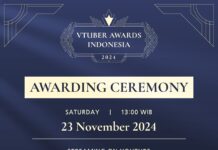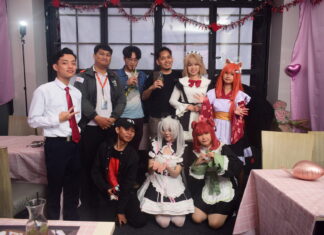Anime distributor Muse Indonesia recently put up a public statement on their Facebook account, expressing their regret for the recent controversy regarding the translated subtitles for Episode 12 of the anime In/Spectre season 2. Due to the incident, Muse Indonesia has announced that they have terminated their working relationship with the translation team that was involved in the controversy, which included translators named Ardie and Kresendo
The controversy arose when viewers noticed that the subtitles for the aforementioned episode uploaded on the Muse Indonesia YouTube channel contained a highly inappropriate comment by the translation team mentioning sexual violence towards underage children. The incident has called into question the professionalism of the translation and quality checking of Muse Indonesia’s releases. The episode in question was uploaded on 26 March and has been taken down as of 27 March 2023.
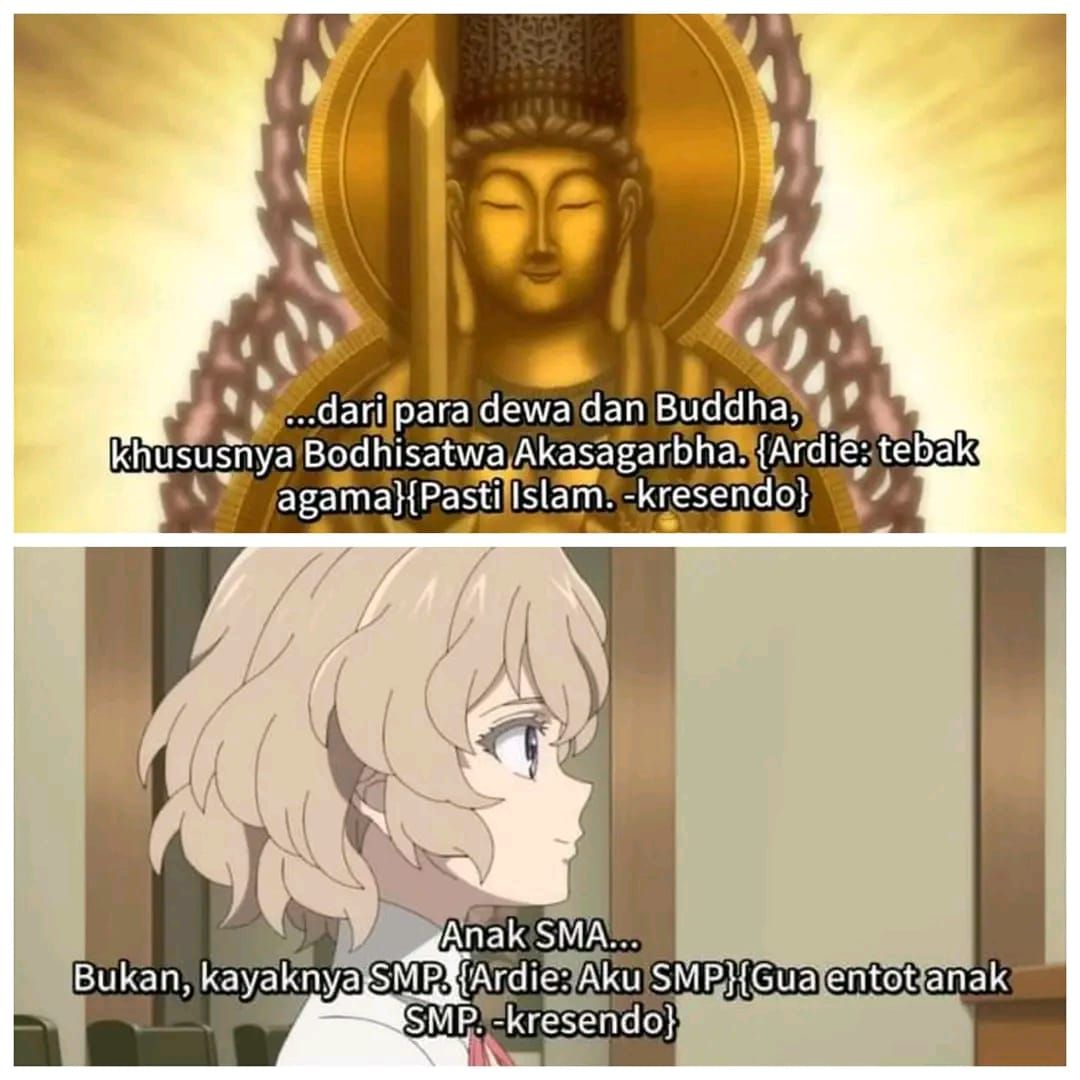
Since then, an ex-Muse freelance translator, Alexander Yosua, has expressed his disappointment through a post on his social media commenting on the issue. He has mentioned how his team were previously tasked with working on episodes of In/Spectre, before the translation was later taken over by Kresendo’s team. He has expressed his disbelief in how such an inappropriate joke can be made in a professional setting.
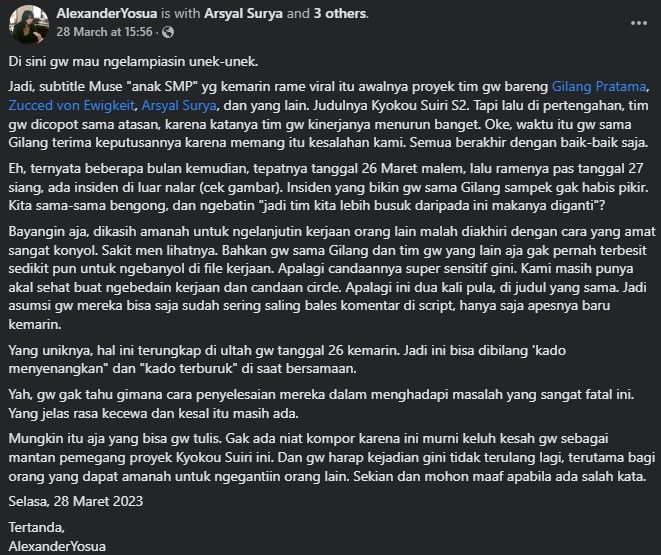
The Indonesian Anime Times contacted Alexander, along with his team member Gilang Pratama, to hear their opinion on the incident, as well as their experience working with Muse Indonesia. This interview has been edited for clarity.
The Indonesian Anime Times: Thank you for reaching back to us. Could you tell us about your team’s background?
Gilang: Our team started working as fansubbers, mostly for J-dramas. There weren’t many J-dramas that had Indonesian subs at the time when we started out. But we’re also anime fans as well.
How did you come to work for Muse Indonesia, and how was the recruitment process?
Gilang: In 2020, we tried contacting one of Muse’s overseas HR accounts. At the time, Muse had yet to officially start their operations in Indonesia and they were actively looking for Indonesian translators. After we passed their test, we officially started our working relationship with Muse.
What was your working relationship with Muse Indonesia like? What did you think of the overall working culture there?
Gilang: They were as professional as you would expect for a legitimate company. We were asked to deliver our work on time, not make any errors, and always be consistent. It was good for building our work discipline. We didn’t communicate much with the other translation teams that work for Muse Indonesia, but we still maintained some communication. Though at times we felt a bit reluctant to fit in, so we kept conversations limited to work-related matters instead of casual topics.
Did you ever meet or communicate with senior leadership or representatives from Muse’s overseas offices?
Gilang: We attended several meetings regularly with leadership and managers from Muse Indonesia, as well as Muse representatives from overseas, and even people from the Japanese side of the operation.
Based on your post, you mentioned that your team were terminated by Muse Indonesia. Could you elaborate on what happened?
Gilang: We had been given a week’s notice beforehand before we were terminated. We worked with Muse Indonesia from mid-2020 until late 2022 in December. There were performance reviews, of course. In late 2022 our work performance declined. With the end of In/Spectre S2’s “Yuki Onna” arc, they expressed to us their assessment of the drop in our translation quality. In this regard, we do admit that our team was at fault and we respect their decision to end our working relationship.
Is it true that recruitment for freelance translators working for Muse Indonesia usually relies on a friendship basis? Is the working environment more akin to how amateur fan translations operate instead of professional ones?
Gilang: Well, translator teams that work for Muse Indonesia generally consist of people who know each other beforehand. So, interactions can feel a little bit casual sometimes. But from our experience, being professional is still a must. If a team employs a new member just because they’re an acquaintance without considering the quality of their work, it would be bad for the team itself. However, the recent controversy has made us think that there’s a lot that we don’t know about how each team operates.
With the recent incident related to Kresendo’s team, would you consider that the translation process in Muse does not employ strict oversight and tight quality control over the results of the work?
Gilang: Speaking of how our team operates, we usually translate the script normally, then add a note with the timestamp if our translator wants an editor to check on a certain line. We do this to prevent any mistakes that might happen. Since our work is usually compiled in an SRT subtitle format, any style or formatting made in an ASS subtitle format would not be converted correctly. We also get feedback from quality control if anything seems out of place or for things that we can improve for the next episode. But we can only speak for our team. we do not how other teams operate.
Do you think Muse Asia (Muse Communications) or Muse Indonesia will enact changes to how they operate as a consequence of this controversy?
Gilang: We think that this is a wake-up call for Muse, for sure. If not for this incident coming to light, other teams would probably still include jokes or other things in their work files. We personally hope that Muse can do better going forward, and for the staff working with them to be even more professional in separating between work and personal issues.
The Indonesian Anime Times has reached out to Muse Indonesia for comment but has yet to receive a reply as of the time of this article’s publishing.
Also read:
Muse Indonesia Apologises for the “In/Spectre” Subtitle Controversy
The Indonesian Anime Times | Interview by Kevin Wilyan | Translated by CES

